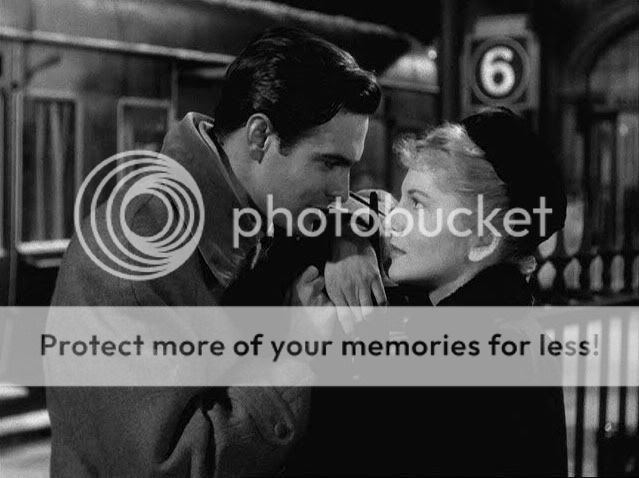
Stefan Brand (Louis Jourdan), a has-been world renowned concert pianist is planning on leaving Vienna in order to avoiding a duel. That same night he receives a letter from an unknown woman. As he sits and reads its many pages the film takes us several decades back, into the mid to late 19th century. There we meet a young lady in her mid-teens named Lisa Berndle (Joan Fontaine).
Lisa lives with her mother and leads a happy life. She’s a careless romantic who one day gets a glimpse of her handsome new neighbour, Stefan. She opens the building door for him, he thanks her. Then he forgets her altogether. Such is the lifestyle and attitude of a rich, famous, and handsome playboy.
Lisa loves to hear to him play at his piano, the beautiful melodies echoing through the thin building walls. She is deeply in love with him and he doesn’t even know that she exists. Fast forward a few years until she’s 18 years of age and is proposed to by a rich aristocrat. She turns him down claiming that she’s engaged to another. She simply can’t get Stefan out of her head.
Lisa believes that there’s nothing that she could do in regards to being together with Stefan but things change when a few more years pass and she visits her old neighbourhood. Stefan catches her starring at him from behind a street corner; she’s fixated on him. He walks over and talks to her, like he would to a complete stranger, and they spontaneously go out on a date that very night. She wants to see him again but alas, he needs to travel to another in Europe and perform. Stefan promises Lisa that he’ll return to her in 12 days but he never does.
Lisa eventually marries that same aristocrat that had asked for her hand in marriage previously and together they have a child; Stefan’s child. But Stefan is never made aware of that.
The film follows Lisa and Stefan, almost a decade after their last meet, and as her life grows more luxurious and is filled with happiness Stefan’s life doesn’t a change a bit. But for some reason Lisa is still fixated with Stefan, even after hearing that he’s through as a pianist. She just can’t let him go but, sadly she doesn’t know just what kind of a person he really is.
Lisa’s husband suspects her of still loving Stefan and he follows her around, but he loves her enough to not let her know that he know that she’s “unfaithful” to him, in one way or another, nor does he do anything about it.
Just as the film opened on Stefan reading Lisa’s letter it closes on him as he finishes reading it. But something entirely unpredictable has happened and the film is summed up in its last few minutes. Letter from an Unknown Woman is a great tragedy and I am glad to have watched it.
Director Max Ophüls loves to move the camera, showing off his enthusiasm for the craft of filmmaking. The camera movements depicting grandiose gestures compliment the film, adding an extra dimension to everything that we see, hear, and feel; he’s also repeated that style later with La Ronde (1950) and Le Plesir (1952).
In that regard, watching an Ophüls film is always a pleasure. But the content of this film and its outstanding performance by Fontaine are what make it utterly amazing to behold and altogether entertaining.
Joan Fontaine was an absolute knockout in her time but was also one of the best actors working in Hollywood, and internationally. She’s worked several times with director George Stevens, several times with Alfred Hitchcock (and had won an Oscar for her performance in Suspicion (1941)); she’s also worked with directors George Cukor, Robert Stevenson, and Orson Welles. Her work in every almost film that she appears in is stellar and she fuels Letter from an Unknown Woman, as well.
But let’s not forget Louis Jourdan; handsome, talented, and an excellent thespian. What else could anyone ask for? Jourdan plays the part of the womanizer very well and makes his job [as an actor] look easy. I felt embarrassed. And together, Fontaine and Jourdan work brilliantly. They appeared to be genuinely in love during those few scenes when they spent time together, which is also largely thankful to the screenwriter.
As a grandiose melodrama this film isn’t annoying or sappy, nor does it feel forced. It’s a short film (only 86 minutes in length) that tells a terrific tragic story that’s based entirely on human nature and how many people act foolishly upon their primal emotions. It’s character driven, brilliantly acted, and gorgeous to look at and with Ophüls’ brilliant black and white cinematography we feel like we’re there. Now that’s what I call movie magic.
Many people may be surprised to realize that both leading actors in this film are still alive. Joan will be turning 95 this year and Louis will be 91.
ReplyDeleteI know! And, unrelated to this film but Shirley Temple is also still alive. :o)
ReplyDelete